Professional Practice in Accounting - A Guide to Pursuing a Career in Auditing with KPMG
VerifiedAdded on 2023/06/07
|11
|3048
|448
AI Summary
This paper discusses the career path in auditing, education requirements, and the labor market outlook. It also explores KPMG as a potential employer, including their culture, mission, and opportunities. The paper concludes with a reflection on how well the author would fit in with KPMG as an auditor.
Contribute Materials
Your contribution can guide someone’s learning journey. Share your
documents today.
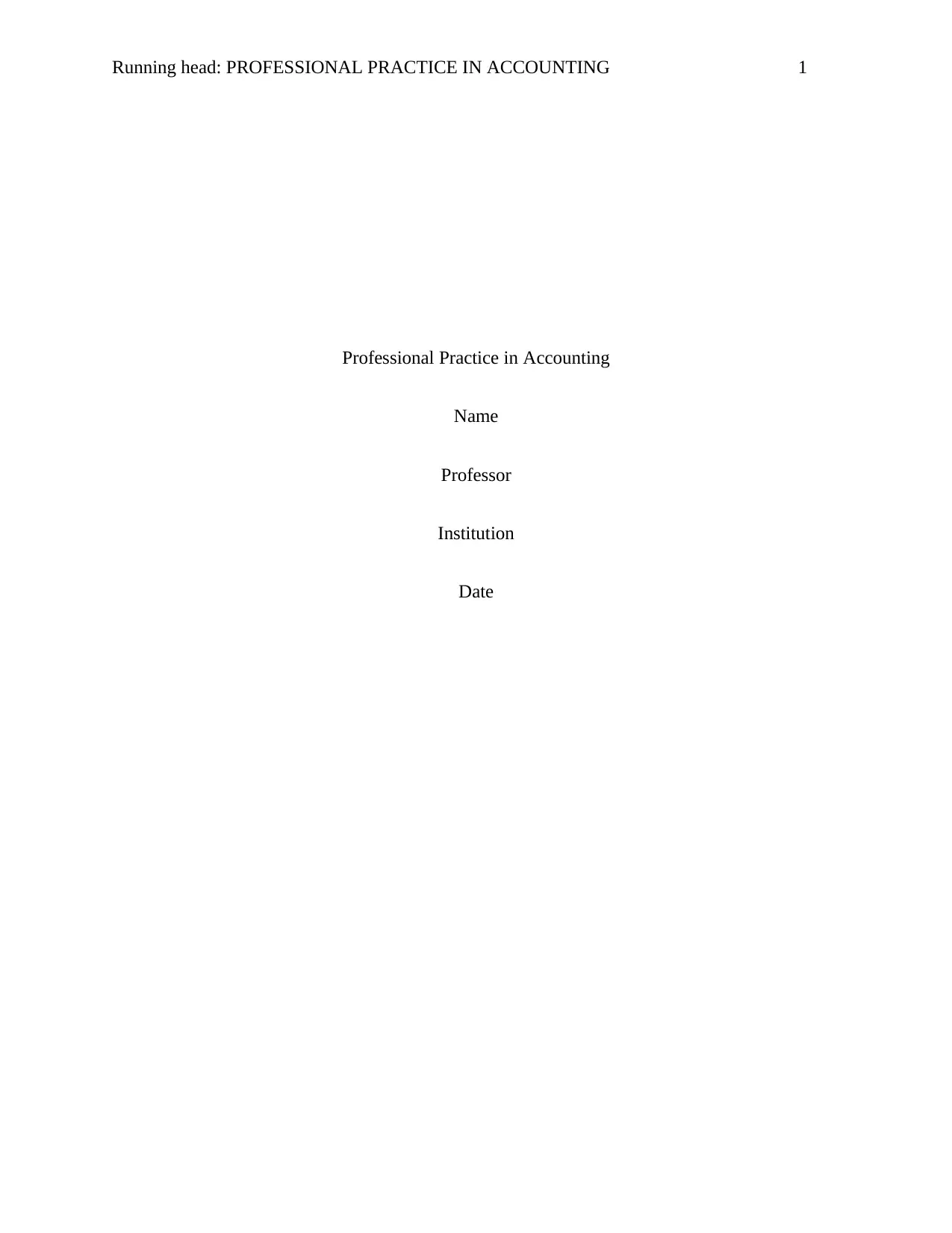
Running head: PROFESSIONAL PRACTICE IN ACCOUNTING 1
Professional Practice in Accounting
Name
Professor
Institution
Date
Professional Practice in Accounting
Name
Professor
Institution
Date
Secure Best Marks with AI Grader
Need help grading? Try our AI Grader for instant feedback on your assignments.
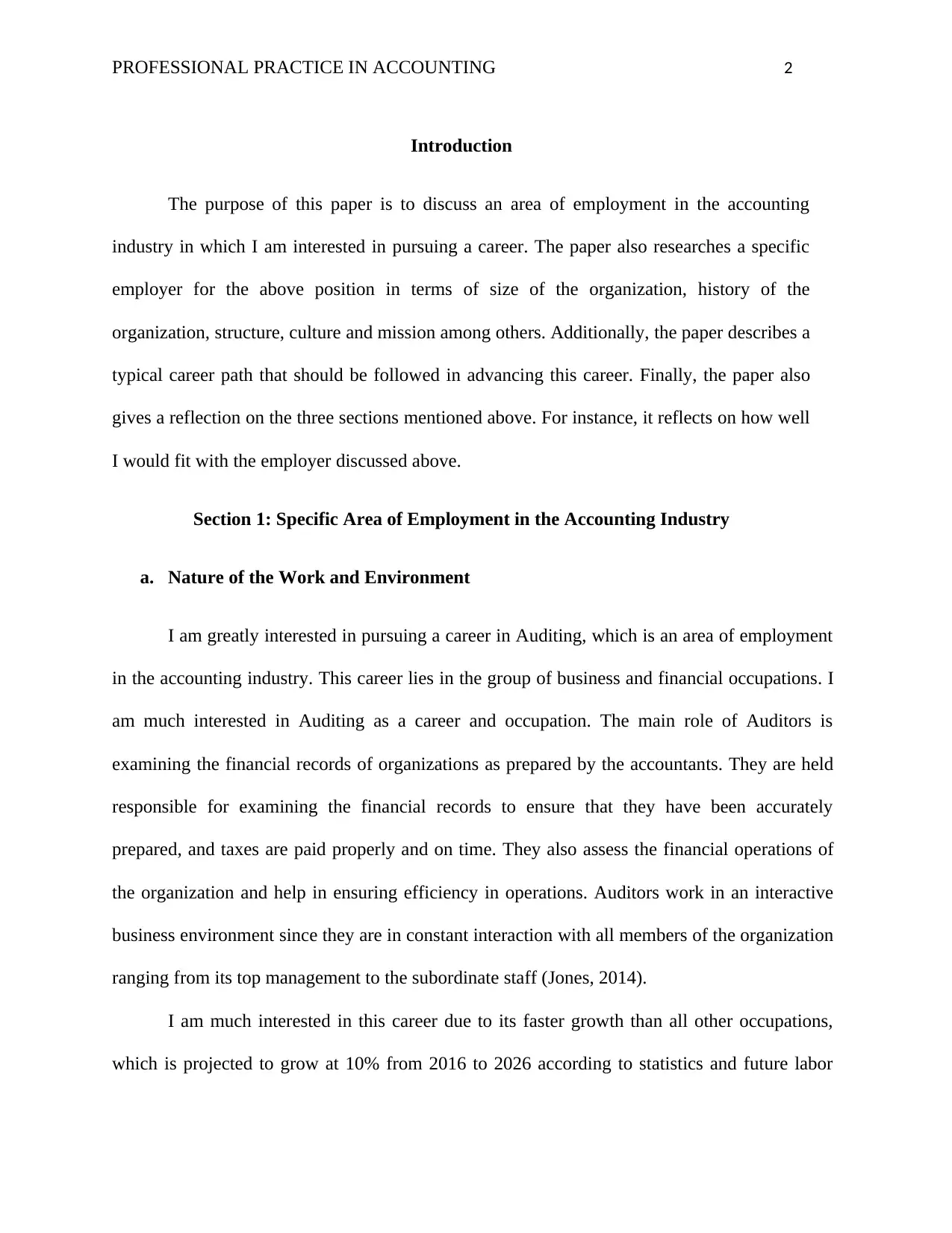
PROFESSIONAL PRACTICE IN ACCOUNTING 2
Introduction
The purpose of this paper is to discuss an area of employment in the accounting
industry in which I am interested in pursuing a career. The paper also researches a specific
employer for the above position in terms of size of the organization, history of the
organization, structure, culture and mission among others. Additionally, the paper describes a
typical career path that should be followed in advancing this career. Finally, the paper also
gives a reflection on the three sections mentioned above. For instance, it reflects on how well
I would fit with the employer discussed above.
Section 1: Specific Area of Employment in the Accounting Industry
a. Nature of the Work and Environment
I am greatly interested in pursuing a career in Auditing, which is an area of employment
in the accounting industry. This career lies in the group of business and financial occupations. I
am much interested in Auditing as a career and occupation. The main role of Auditors is
examining the financial records of organizations as prepared by the accountants. They are held
responsible for examining the financial records to ensure that they have been accurately
prepared, and taxes are paid properly and on time. They also assess the financial operations of
the organization and help in ensuring efficiency in operations. Auditors work in an interactive
business environment since they are in constant interaction with all members of the organization
ranging from its top management to the subordinate staff (Jones, 2014).
I am much interested in this career due to its faster growth than all other occupations,
which is projected to grow at 10% from 2016 to 2026 according to statistics and future labor
Introduction
The purpose of this paper is to discuss an area of employment in the accounting
industry in which I am interested in pursuing a career. The paper also researches a specific
employer for the above position in terms of size of the organization, history of the
organization, structure, culture and mission among others. Additionally, the paper describes a
typical career path that should be followed in advancing this career. Finally, the paper also
gives a reflection on the three sections mentioned above. For instance, it reflects on how well
I would fit with the employer discussed above.
Section 1: Specific Area of Employment in the Accounting Industry
a. Nature of the Work and Environment
I am greatly interested in pursuing a career in Auditing, which is an area of employment
in the accounting industry. This career lies in the group of business and financial occupations. I
am much interested in Auditing as a career and occupation. The main role of Auditors is
examining the financial records of organizations as prepared by the accountants. They are held
responsible for examining the financial records to ensure that they have been accurately
prepared, and taxes are paid properly and on time. They also assess the financial operations of
the organization and help in ensuring efficiency in operations. Auditors work in an interactive
business environment since they are in constant interaction with all members of the organization
ranging from its top management to the subordinate staff (Jones, 2014).
I am much interested in this career due to its faster growth than all other occupations,
which is projected to grow at 10% from 2016 to 2026 according to statistics and future labor
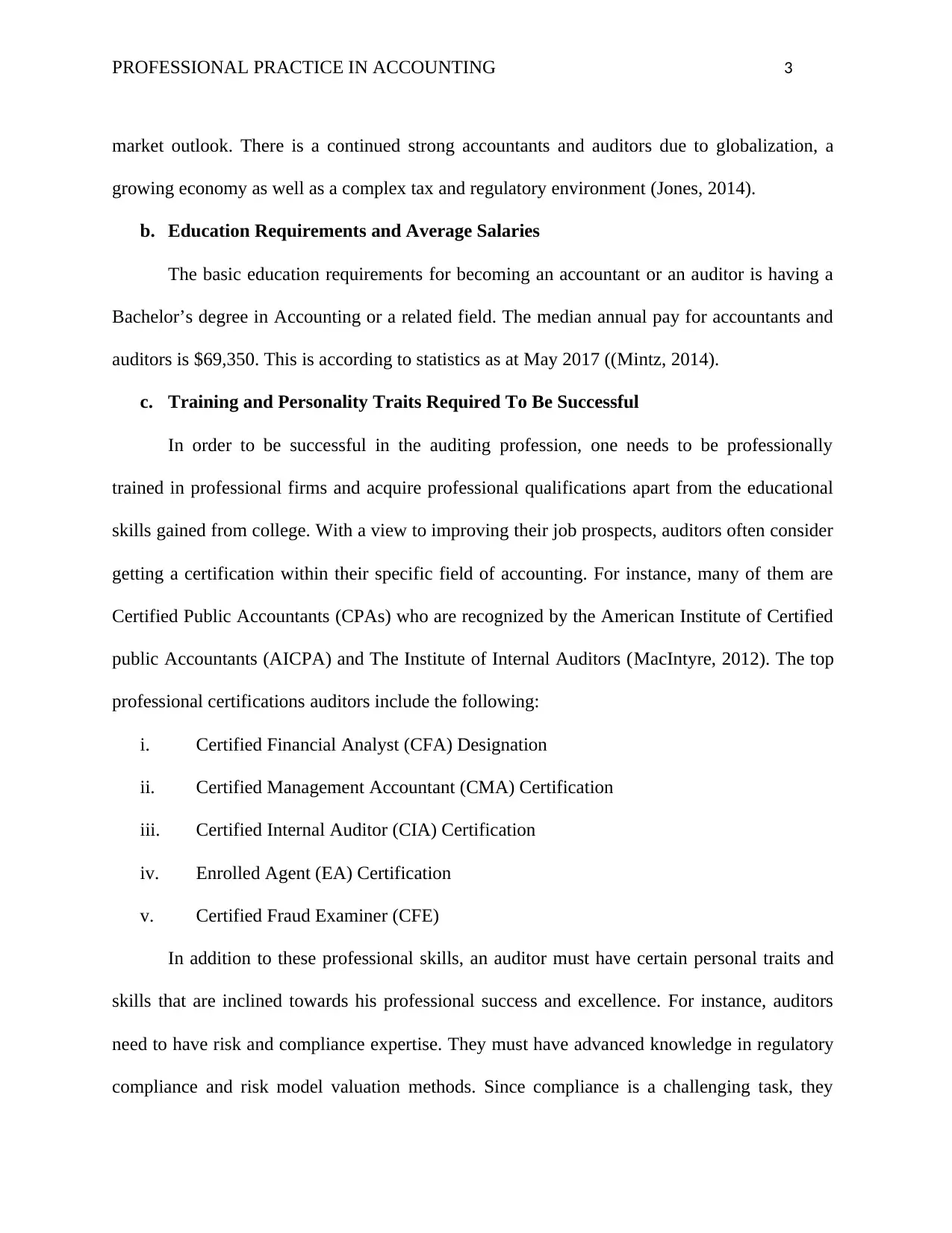
PROFESSIONAL PRACTICE IN ACCOUNTING 3
market outlook. There is a continued strong accountants and auditors due to globalization, a
growing economy as well as a complex tax and regulatory environment (Jones, 2014).
b. Education Requirements and Average Salaries
The basic education requirements for becoming an accountant or an auditor is having a
Bachelor’s degree in Accounting or a related field. The median annual pay for accountants and
auditors is $69,350. This is according to statistics as at May 2017 ((Mintz, 2014).
c. Training and Personality Traits Required To Be Successful
In order to be successful in the auditing profession, one needs to be professionally
trained in professional firms and acquire professional qualifications apart from the educational
skills gained from college. With a view to improving their job prospects, auditors often consider
getting a certification within their specific field of accounting. For instance, many of them are
Certified Public Accountants (CPAs) who are recognized by the American Institute of Certified
public Accountants (AICPA) and The Institute of Internal Auditors (MacIntyre, 2012). The top
professional certifications auditors include the following:
i. Certified Financial Analyst (CFA) Designation
ii. Certified Management Accountant (CMA) Certification
iii. Certified Internal Auditor (CIA) Certification
iv. Enrolled Agent (EA) Certification
v. Certified Fraud Examiner (CFE)
In addition to these professional skills, an auditor must have certain personal traits and
skills that are inclined towards his professional success and excellence. For instance, auditors
need to have risk and compliance expertise. They must have advanced knowledge in regulatory
compliance and risk model valuation methods. Since compliance is a challenging task, they
market outlook. There is a continued strong accountants and auditors due to globalization, a
growing economy as well as a complex tax and regulatory environment (Jones, 2014).
b. Education Requirements and Average Salaries
The basic education requirements for becoming an accountant or an auditor is having a
Bachelor’s degree in Accounting or a related field. The median annual pay for accountants and
auditors is $69,350. This is according to statistics as at May 2017 ((Mintz, 2014).
c. Training and Personality Traits Required To Be Successful
In order to be successful in the auditing profession, one needs to be professionally
trained in professional firms and acquire professional qualifications apart from the educational
skills gained from college. With a view to improving their job prospects, auditors often consider
getting a certification within their specific field of accounting. For instance, many of them are
Certified Public Accountants (CPAs) who are recognized by the American Institute of Certified
public Accountants (AICPA) and The Institute of Internal Auditors (MacIntyre, 2012). The top
professional certifications auditors include the following:
i. Certified Financial Analyst (CFA) Designation
ii. Certified Management Accountant (CMA) Certification
iii. Certified Internal Auditor (CIA) Certification
iv. Enrolled Agent (EA) Certification
v. Certified Fraud Examiner (CFE)
In addition to these professional skills, an auditor must have certain personal traits and
skills that are inclined towards his professional success and excellence. For instance, auditors
need to have risk and compliance expertise. They must have advanced knowledge in regulatory
compliance and risk model valuation methods. Since compliance is a challenging task, they
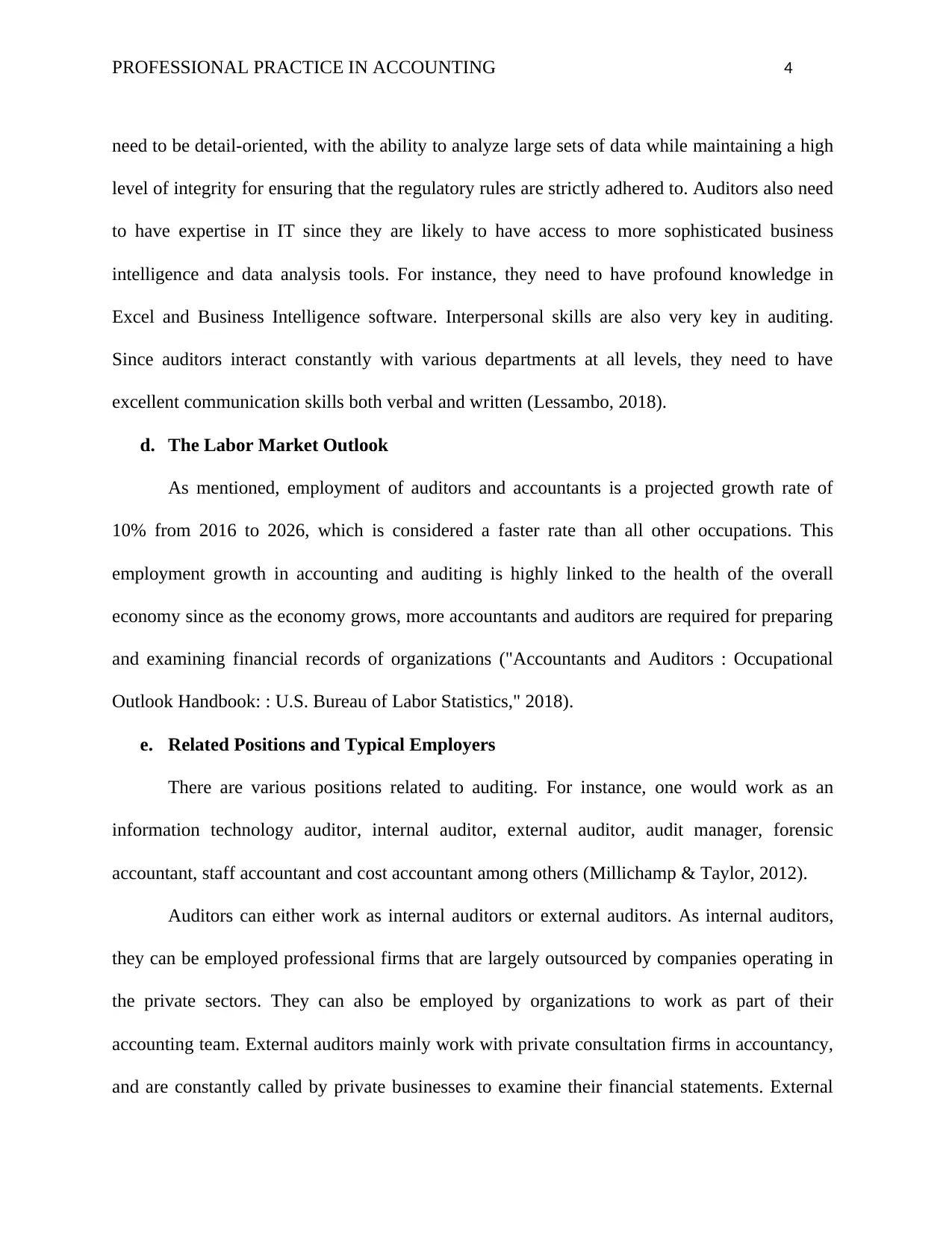
PROFESSIONAL PRACTICE IN ACCOUNTING 4
need to be detail-oriented, with the ability to analyze large sets of data while maintaining a high
level of integrity for ensuring that the regulatory rules are strictly adhered to. Auditors also need
to have expertise in IT since they are likely to have access to more sophisticated business
intelligence and data analysis tools. For instance, they need to have profound knowledge in
Excel and Business Intelligence software. Interpersonal skills are also very key in auditing.
Since auditors interact constantly with various departments at all levels, they need to have
excellent communication skills both verbal and written (Lessambo, 2018).
d. The Labor Market Outlook
As mentioned, employment of auditors and accountants is a projected growth rate of
10% from 2016 to 2026, which is considered a faster rate than all other occupations. This
employment growth in accounting and auditing is highly linked to the health of the overall
economy since as the economy grows, more accountants and auditors are required for preparing
and examining financial records of organizations ("Accountants and Auditors : Occupational
Outlook Handbook: : U.S. Bureau of Labor Statistics," 2018).
e. Related Positions and Typical Employers
There are various positions related to auditing. For instance, one would work as an
information technology auditor, internal auditor, external auditor, audit manager, forensic
accountant, staff accountant and cost accountant among others (Millichamp & Taylor, 2012).
Auditors can either work as internal auditors or external auditors. As internal auditors,
they can be employed professional firms that are largely outsourced by companies operating in
the private sectors. They can also be employed by organizations to work as part of their
accounting team. External auditors mainly work with private consultation firms in accountancy,
and are constantly called by private businesses to examine their financial statements. External
need to be detail-oriented, with the ability to analyze large sets of data while maintaining a high
level of integrity for ensuring that the regulatory rules are strictly adhered to. Auditors also need
to have expertise in IT since they are likely to have access to more sophisticated business
intelligence and data analysis tools. For instance, they need to have profound knowledge in
Excel and Business Intelligence software. Interpersonal skills are also very key in auditing.
Since auditors interact constantly with various departments at all levels, they need to have
excellent communication skills both verbal and written (Lessambo, 2018).
d. The Labor Market Outlook
As mentioned, employment of auditors and accountants is a projected growth rate of
10% from 2016 to 2026, which is considered a faster rate than all other occupations. This
employment growth in accounting and auditing is highly linked to the health of the overall
economy since as the economy grows, more accountants and auditors are required for preparing
and examining financial records of organizations ("Accountants and Auditors : Occupational
Outlook Handbook: : U.S. Bureau of Labor Statistics," 2018).
e. Related Positions and Typical Employers
There are various positions related to auditing. For instance, one would work as an
information technology auditor, internal auditor, external auditor, audit manager, forensic
accountant, staff accountant and cost accountant among others (Millichamp & Taylor, 2012).
Auditors can either work as internal auditors or external auditors. As internal auditors,
they can be employed professional firms that are largely outsourced by companies operating in
the private sectors. They can also be employed by organizations to work as part of their
accounting team. External auditors mainly work with private consultation firms in accountancy,
and are constantly called by private businesses to examine their financial statements. External
Paraphrase This Document
Need a fresh take? Get an instant paraphrase of this document with our AI Paraphraser
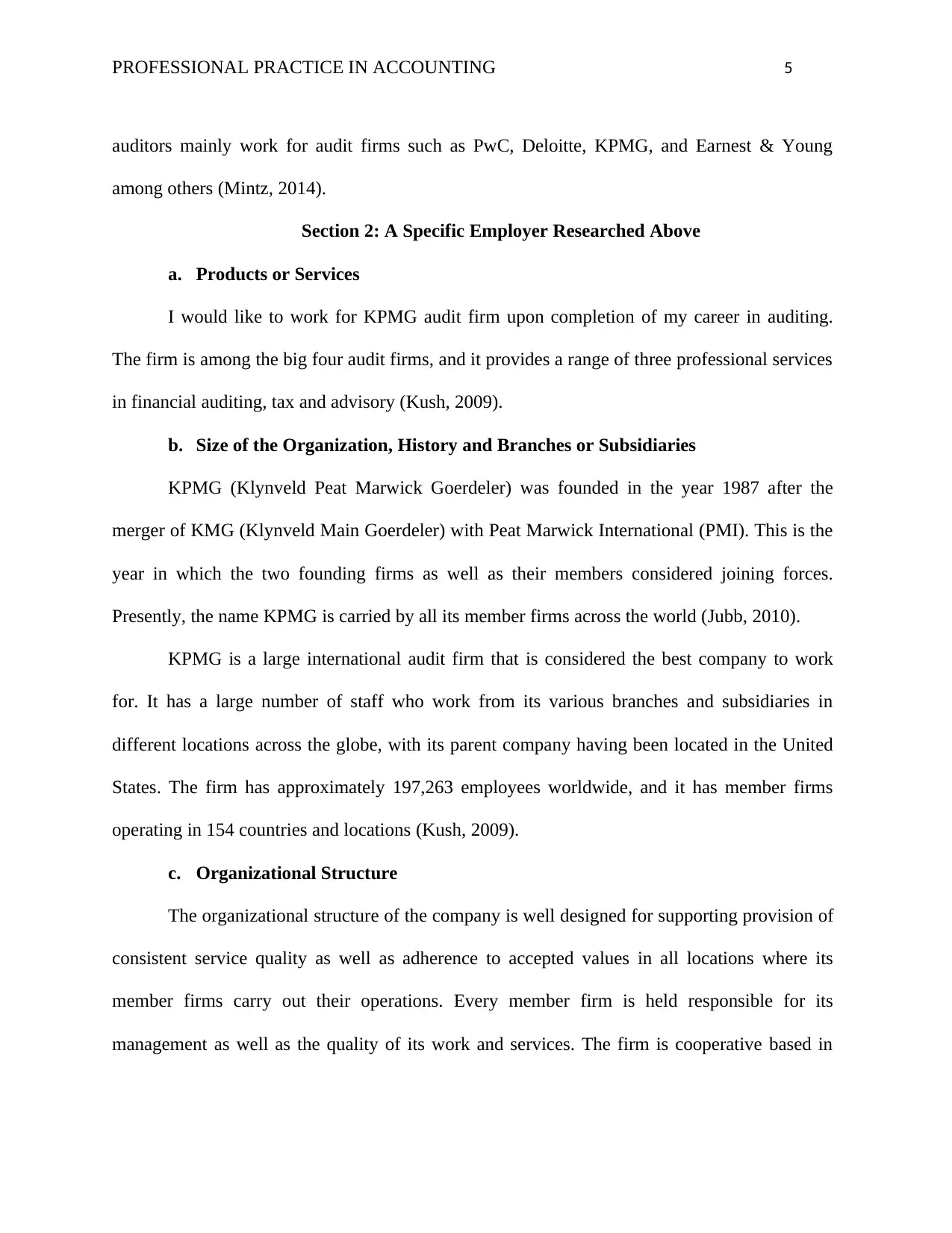
PROFESSIONAL PRACTICE IN ACCOUNTING 5
auditors mainly work for audit firms such as PwC, Deloitte, KPMG, and Earnest & Young
among others (Mintz, 2014).
Section 2: A Specific Employer Researched Above
a. Products or Services
I would like to work for KPMG audit firm upon completion of my career in auditing.
The firm is among the big four audit firms, and it provides a range of three professional services
in financial auditing, tax and advisory (Kush, 2009).
b. Size of the Organization, History and Branches or Subsidiaries
KPMG (Klynveld Peat Marwick Goerdeler) was founded in the year 1987 after the
merger of KMG (Klynveld Main Goerdeler) with Peat Marwick International (PMI). This is the
year in which the two founding firms as well as their members considered joining forces.
Presently, the name KPMG is carried by all its member firms across the world (Jubb, 2010).
KPMG is a large international audit firm that is considered the best company to work
for. It has a large number of staff who work from its various branches and subsidiaries in
different locations across the globe, with its parent company having been located in the United
States. The firm has approximately 197,263 employees worldwide, and it has member firms
operating in 154 countries and locations (Kush, 2009).
c. Organizational Structure
The organizational structure of the company is well designed for supporting provision of
consistent service quality as well as adherence to accepted values in all locations where its
member firms carry out their operations. Every member firm is held responsible for its
management as well as the quality of its work and services. The firm is cooperative based in
auditors mainly work for audit firms such as PwC, Deloitte, KPMG, and Earnest & Young
among others (Mintz, 2014).
Section 2: A Specific Employer Researched Above
a. Products or Services
I would like to work for KPMG audit firm upon completion of my career in auditing.
The firm is among the big four audit firms, and it provides a range of three professional services
in financial auditing, tax and advisory (Kush, 2009).
b. Size of the Organization, History and Branches or Subsidiaries
KPMG (Klynveld Peat Marwick Goerdeler) was founded in the year 1987 after the
merger of KMG (Klynveld Main Goerdeler) with Peat Marwick International (PMI). This is the
year in which the two founding firms as well as their members considered joining forces.
Presently, the name KPMG is carried by all its member firms across the world (Jubb, 2010).
KPMG is a large international audit firm that is considered the best company to work
for. It has a large number of staff who work from its various branches and subsidiaries in
different locations across the globe, with its parent company having been located in the United
States. The firm has approximately 197,263 employees worldwide, and it has member firms
operating in 154 countries and locations (Kush, 2009).
c. Organizational Structure
The organizational structure of the company is well designed for supporting provision of
consistent service quality as well as adherence to accepted values in all locations where its
member firms carry out their operations. Every member firm is held responsible for its
management as well as the quality of its work and services. The firm is cooperative based in
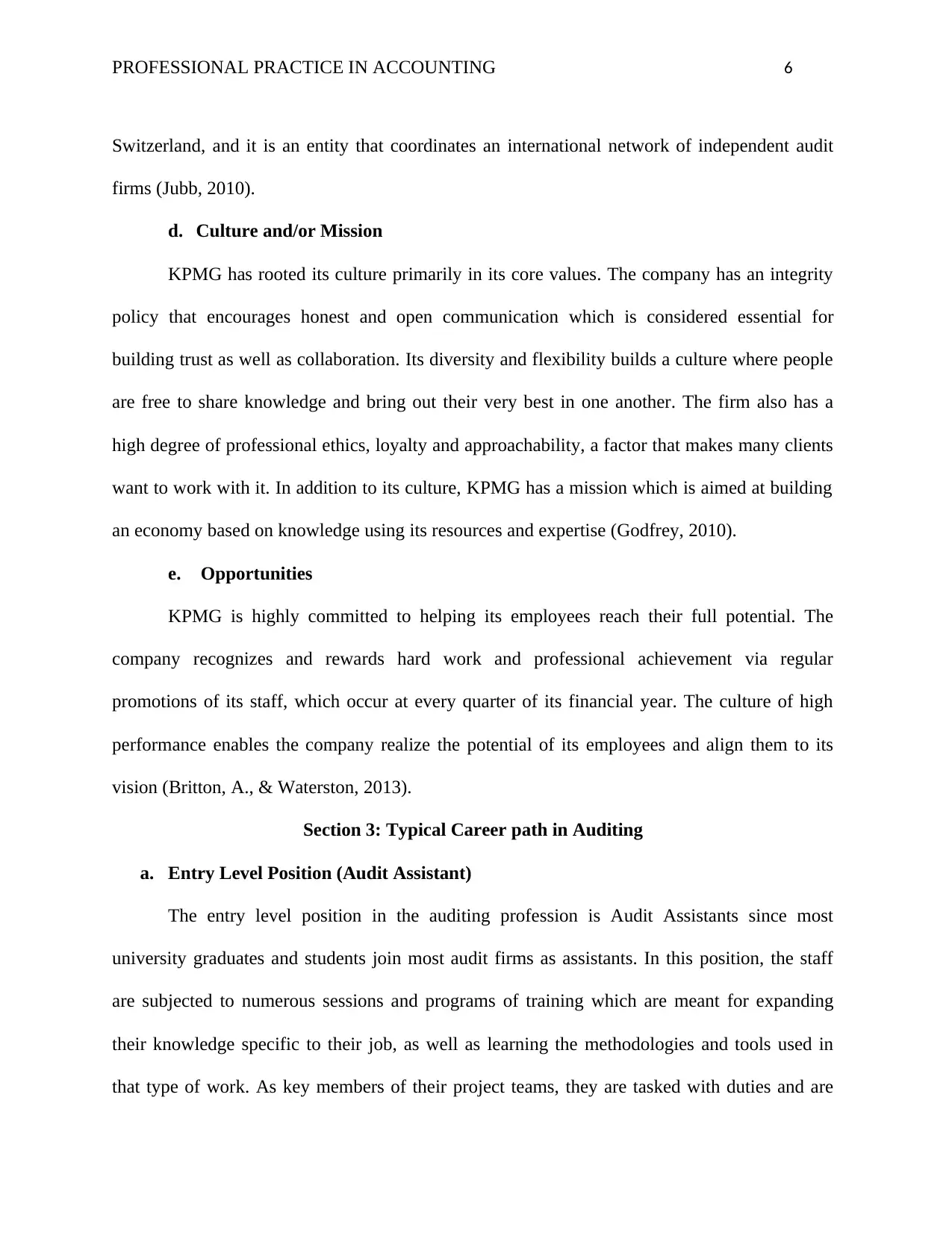
PROFESSIONAL PRACTICE IN ACCOUNTING 6
Switzerland, and it is an entity that coordinates an international network of independent audit
firms (Jubb, 2010).
d. Culture and/or Mission
KPMG has rooted its culture primarily in its core values. The company has an integrity
policy that encourages honest and open communication which is considered essential for
building trust as well as collaboration. Its diversity and flexibility builds a culture where people
are free to share knowledge and bring out their very best in one another. The firm also has a
high degree of professional ethics, loyalty and approachability, a factor that makes many clients
want to work with it. In addition to its culture, KPMG has a mission which is aimed at building
an economy based on knowledge using its resources and expertise (Godfrey, 2010).
e. Opportunities
KPMG is highly committed to helping its employees reach their full potential. The
company recognizes and rewards hard work and professional achievement via regular
promotions of its staff, which occur at every quarter of its financial year. The culture of high
performance enables the company realize the potential of its employees and align them to its
vision (Britton, A., & Waterston, 2013).
Section 3: Typical Career path in Auditing
a. Entry Level Position (Audit Assistant)
The entry level position in the auditing profession is Audit Assistants since most
university graduates and students join most audit firms as assistants. In this position, the staff
are subjected to numerous sessions and programs of training which are meant for expanding
their knowledge specific to their job, as well as learning the methodologies and tools used in
that type of work. As key members of their project teams, they are tasked with duties and are
Switzerland, and it is an entity that coordinates an international network of independent audit
firms (Jubb, 2010).
d. Culture and/or Mission
KPMG has rooted its culture primarily in its core values. The company has an integrity
policy that encourages honest and open communication which is considered essential for
building trust as well as collaboration. Its diversity and flexibility builds a culture where people
are free to share knowledge and bring out their very best in one another. The firm also has a
high degree of professional ethics, loyalty and approachability, a factor that makes many clients
want to work with it. In addition to its culture, KPMG has a mission which is aimed at building
an economy based on knowledge using its resources and expertise (Godfrey, 2010).
e. Opportunities
KPMG is highly committed to helping its employees reach their full potential. The
company recognizes and rewards hard work and professional achievement via regular
promotions of its staff, which occur at every quarter of its financial year. The culture of high
performance enables the company realize the potential of its employees and align them to its
vision (Britton, A., & Waterston, 2013).
Section 3: Typical Career path in Auditing
a. Entry Level Position (Audit Assistant)
The entry level position in the auditing profession is Audit Assistants since most
university graduates and students join most audit firms as assistants. In this position, the staff
are subjected to numerous sessions and programs of training which are meant for expanding
their knowledge specific to their job, as well as learning the methodologies and tools used in
that type of work. As key members of their project teams, they are tasked with duties and are
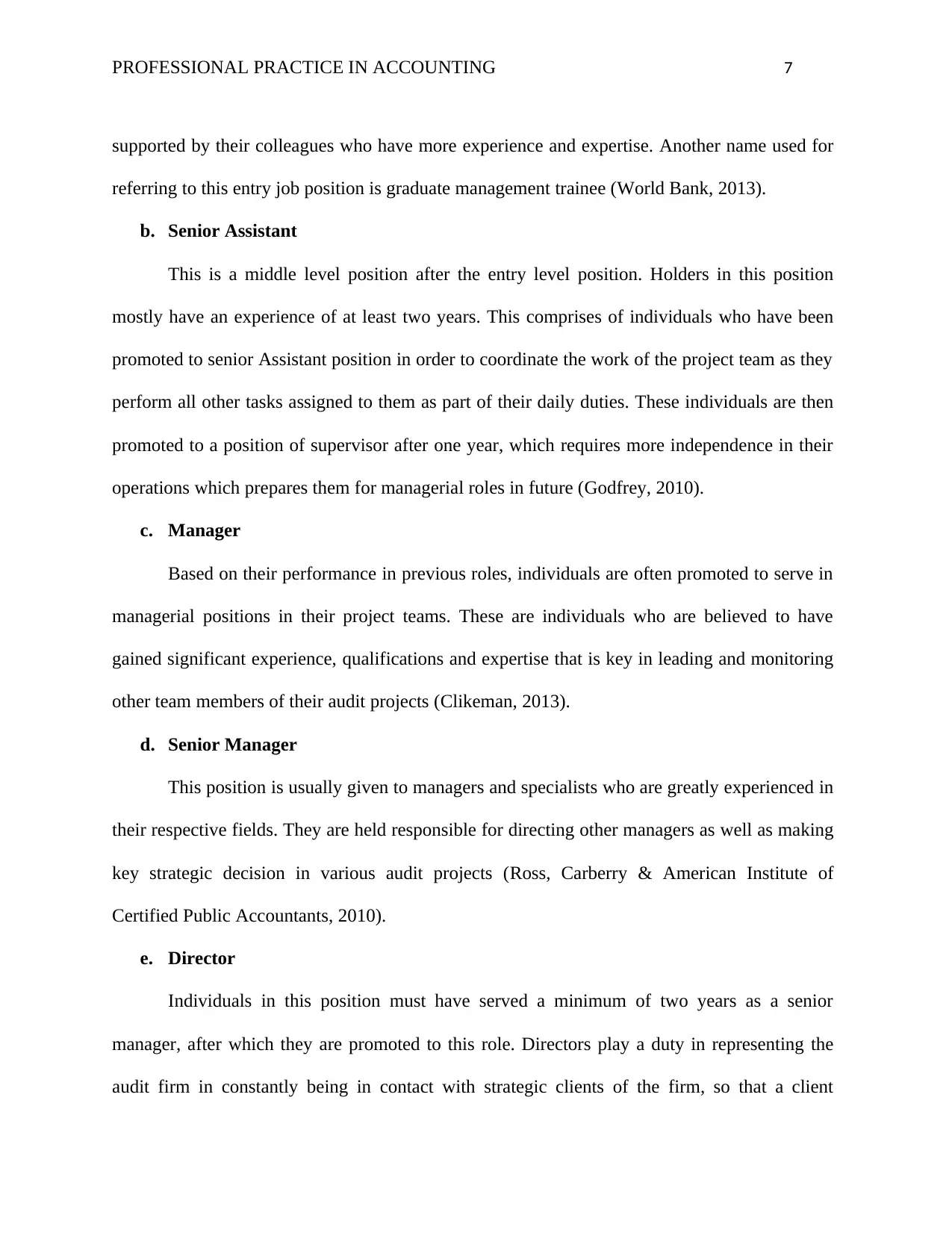
PROFESSIONAL PRACTICE IN ACCOUNTING 7
supported by their colleagues who have more experience and expertise. Another name used for
referring to this entry job position is graduate management trainee (World Bank, 2013).
b. Senior Assistant
This is a middle level position after the entry level position. Holders in this position
mostly have an experience of at least two years. This comprises of individuals who have been
promoted to senior Assistant position in order to coordinate the work of the project team as they
perform all other tasks assigned to them as part of their daily duties. These individuals are then
promoted to a position of supervisor after one year, which requires more independence in their
operations which prepares them for managerial roles in future (Godfrey, 2010).
c. Manager
Based on their performance in previous roles, individuals are often promoted to serve in
managerial positions in their project teams. These are individuals who are believed to have
gained significant experience, qualifications and expertise that is key in leading and monitoring
other team members of their audit projects (Clikeman, 2013).
d. Senior Manager
This position is usually given to managers and specialists who are greatly experienced in
their respective fields. They are held responsible for directing other managers as well as making
key strategic decision in various audit projects (Ross, Carberry & American Institute of
Certified Public Accountants, 2010).
e. Director
Individuals in this position must have served a minimum of two years as a senior
manager, after which they are promoted to this role. Directors play a duty in representing the
audit firm in constantly being in contact with strategic clients of the firm, so that a client
supported by their colleagues who have more experience and expertise. Another name used for
referring to this entry job position is graduate management trainee (World Bank, 2013).
b. Senior Assistant
This is a middle level position after the entry level position. Holders in this position
mostly have an experience of at least two years. This comprises of individuals who have been
promoted to senior Assistant position in order to coordinate the work of the project team as they
perform all other tasks assigned to them as part of their daily duties. These individuals are then
promoted to a position of supervisor after one year, which requires more independence in their
operations which prepares them for managerial roles in future (Godfrey, 2010).
c. Manager
Based on their performance in previous roles, individuals are often promoted to serve in
managerial positions in their project teams. These are individuals who are believed to have
gained significant experience, qualifications and expertise that is key in leading and monitoring
other team members of their audit projects (Clikeman, 2013).
d. Senior Manager
This position is usually given to managers and specialists who are greatly experienced in
their respective fields. They are held responsible for directing other managers as well as making
key strategic decision in various audit projects (Ross, Carberry & American Institute of
Certified Public Accountants, 2010).
e. Director
Individuals in this position must have served a minimum of two years as a senior
manager, after which they are promoted to this role. Directors play a duty in representing the
audit firm in constantly being in contact with strategic clients of the firm, so that a client
Secure Best Marks with AI Grader
Need help grading? Try our AI Grader for instant feedback on your assignments.
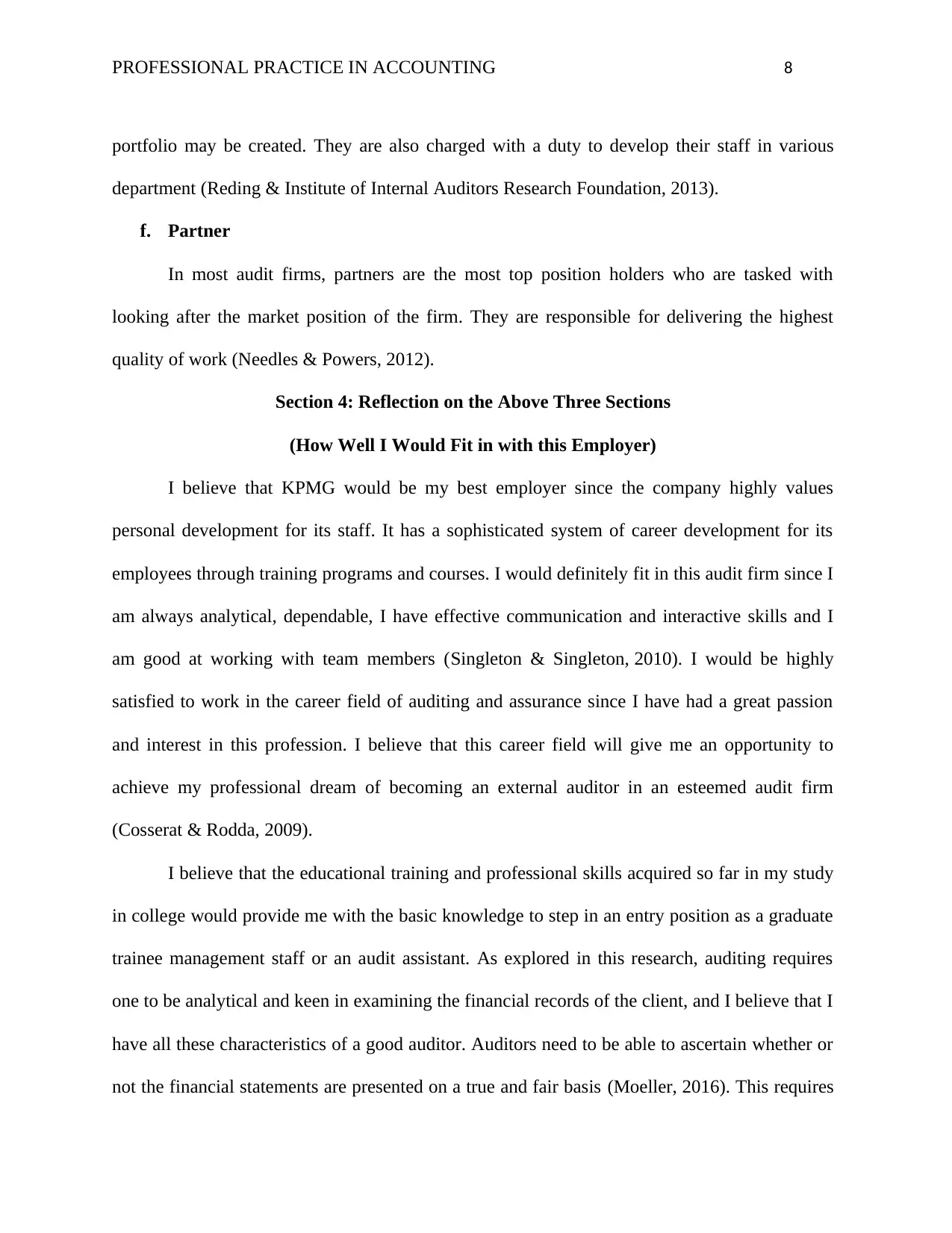
PROFESSIONAL PRACTICE IN ACCOUNTING 8
portfolio may be created. They are also charged with a duty to develop their staff in various
department (Reding & Institute of Internal Auditors Research Foundation, 2013).
f. Partner
In most audit firms, partners are the most top position holders who are tasked with
looking after the market position of the firm. They are responsible for delivering the highest
quality of work (Needles & Powers, 2012).
Section 4: Reflection on the Above Three Sections
(How Well I Would Fit in with this Employer)
I believe that KPMG would be my best employer since the company highly values
personal development for its staff. It has a sophisticated system of career development for its
employees through training programs and courses. I would definitely fit in this audit firm since I
am always analytical, dependable, I have effective communication and interactive skills and I
am good at working with team members (Singleton & Singleton, 2010). I would be highly
satisfied to work in the career field of auditing and assurance since I have had a great passion
and interest in this profession. I believe that this career field will give me an opportunity to
achieve my professional dream of becoming an external auditor in an esteemed audit firm
(Cosserat & Rodda, 2009).
I believe that the educational training and professional skills acquired so far in my study
in college would provide me with the basic knowledge to step in an entry position as a graduate
trainee management staff or an audit assistant. As explored in this research, auditing requires
one to be analytical and keen in examining the financial records of the client, and I believe that I
have all these characteristics of a good auditor. Auditors need to be able to ascertain whether or
not the financial statements are presented on a true and fair basis (Moeller, 2016). This requires
portfolio may be created. They are also charged with a duty to develop their staff in various
department (Reding & Institute of Internal Auditors Research Foundation, 2013).
f. Partner
In most audit firms, partners are the most top position holders who are tasked with
looking after the market position of the firm. They are responsible for delivering the highest
quality of work (Needles & Powers, 2012).
Section 4: Reflection on the Above Three Sections
(How Well I Would Fit in with this Employer)
I believe that KPMG would be my best employer since the company highly values
personal development for its staff. It has a sophisticated system of career development for its
employees through training programs and courses. I would definitely fit in this audit firm since I
am always analytical, dependable, I have effective communication and interactive skills and I
am good at working with team members (Singleton & Singleton, 2010). I would be highly
satisfied to work in the career field of auditing and assurance since I have had a great passion
and interest in this profession. I believe that this career field will give me an opportunity to
achieve my professional dream of becoming an external auditor in an esteemed audit firm
(Cosserat & Rodda, 2009).
I believe that the educational training and professional skills acquired so far in my study
in college would provide me with the basic knowledge to step in an entry position as a graduate
trainee management staff or an audit assistant. As explored in this research, auditing requires
one to be analytical and keen in examining the financial records of the client, and I believe that I
have all these characteristics of a good auditor. Auditors need to be able to ascertain whether or
not the financial statements are presented on a true and fair basis (Moeller, 2016). This requires
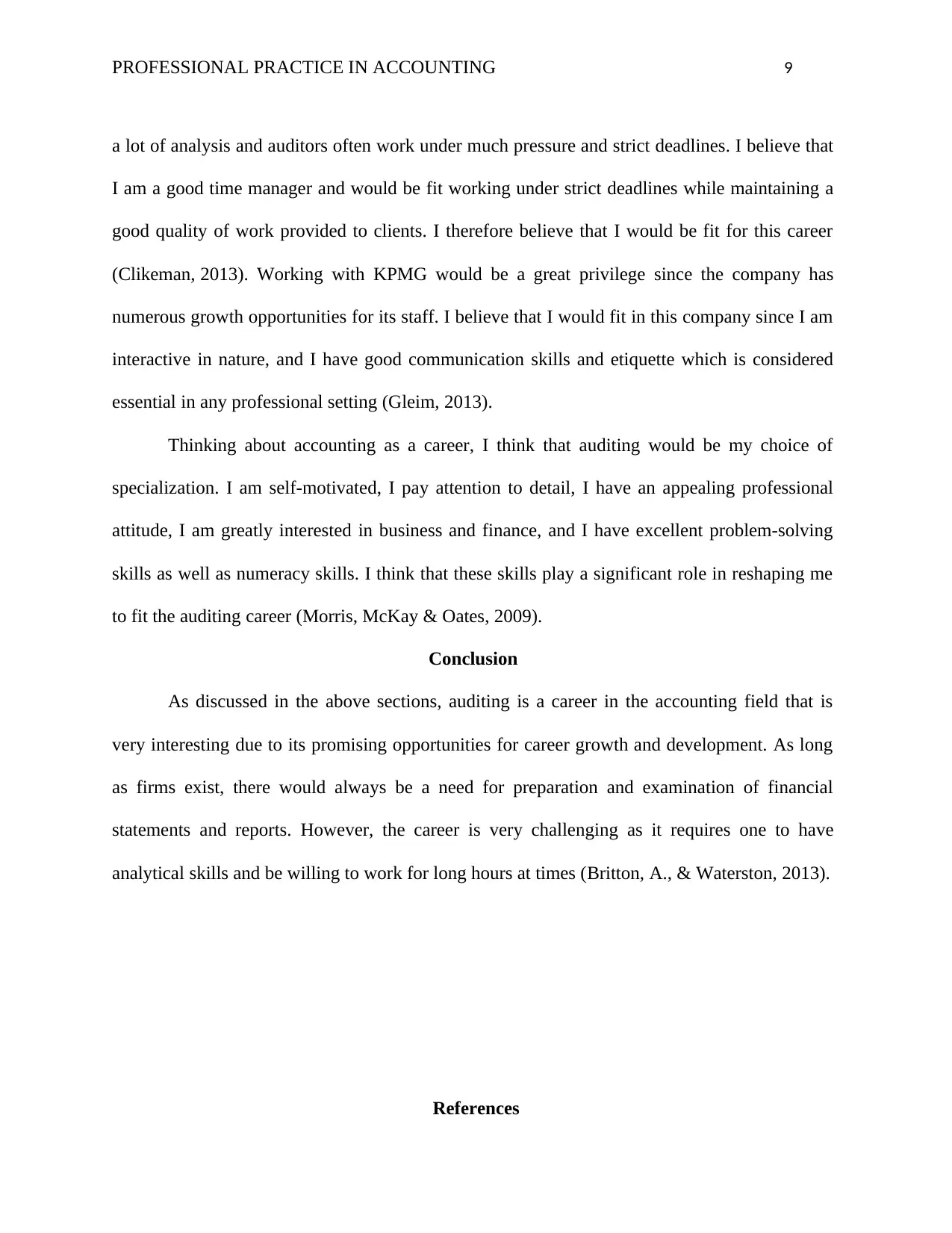
PROFESSIONAL PRACTICE IN ACCOUNTING 9
a lot of analysis and auditors often work under much pressure and strict deadlines. I believe that
I am a good time manager and would be fit working under strict deadlines while maintaining a
good quality of work provided to clients. I therefore believe that I would be fit for this career
(Clikeman, 2013). Working with KPMG would be a great privilege since the company has
numerous growth opportunities for its staff. I believe that I would fit in this company since I am
interactive in nature, and I have good communication skills and etiquette which is considered
essential in any professional setting (Gleim, 2013).
Thinking about accounting as a career, I think that auditing would be my choice of
specialization. I am self-motivated, I pay attention to detail, I have an appealing professional
attitude, I am greatly interested in business and finance, and I have excellent problem-solving
skills as well as numeracy skills. I think that these skills play a significant role in reshaping me
to fit the auditing career (Morris, McKay & Oates, 2009).
Conclusion
As discussed in the above sections, auditing is a career in the accounting field that is
very interesting due to its promising opportunities for career growth and development. As long
as firms exist, there would always be a need for preparation and examination of financial
statements and reports. However, the career is very challenging as it requires one to have
analytical skills and be willing to work for long hours at times (Britton, A., & Waterston, 2013).
References
a lot of analysis and auditors often work under much pressure and strict deadlines. I believe that
I am a good time manager and would be fit working under strict deadlines while maintaining a
good quality of work provided to clients. I therefore believe that I would be fit for this career
(Clikeman, 2013). Working with KPMG would be a great privilege since the company has
numerous growth opportunities for its staff. I believe that I would fit in this company since I am
interactive in nature, and I have good communication skills and etiquette which is considered
essential in any professional setting (Gleim, 2013).
Thinking about accounting as a career, I think that auditing would be my choice of
specialization. I am self-motivated, I pay attention to detail, I have an appealing professional
attitude, I am greatly interested in business and finance, and I have excellent problem-solving
skills as well as numeracy skills. I think that these skills play a significant role in reshaping me
to fit the auditing career (Morris, McKay & Oates, 2009).
Conclusion
As discussed in the above sections, auditing is a career in the accounting field that is
very interesting due to its promising opportunities for career growth and development. As long
as firms exist, there would always be a need for preparation and examination of financial
statements and reports. However, the career is very challenging as it requires one to have
analytical skills and be willing to work for long hours at times (Britton, A., & Waterston, 2013).
References
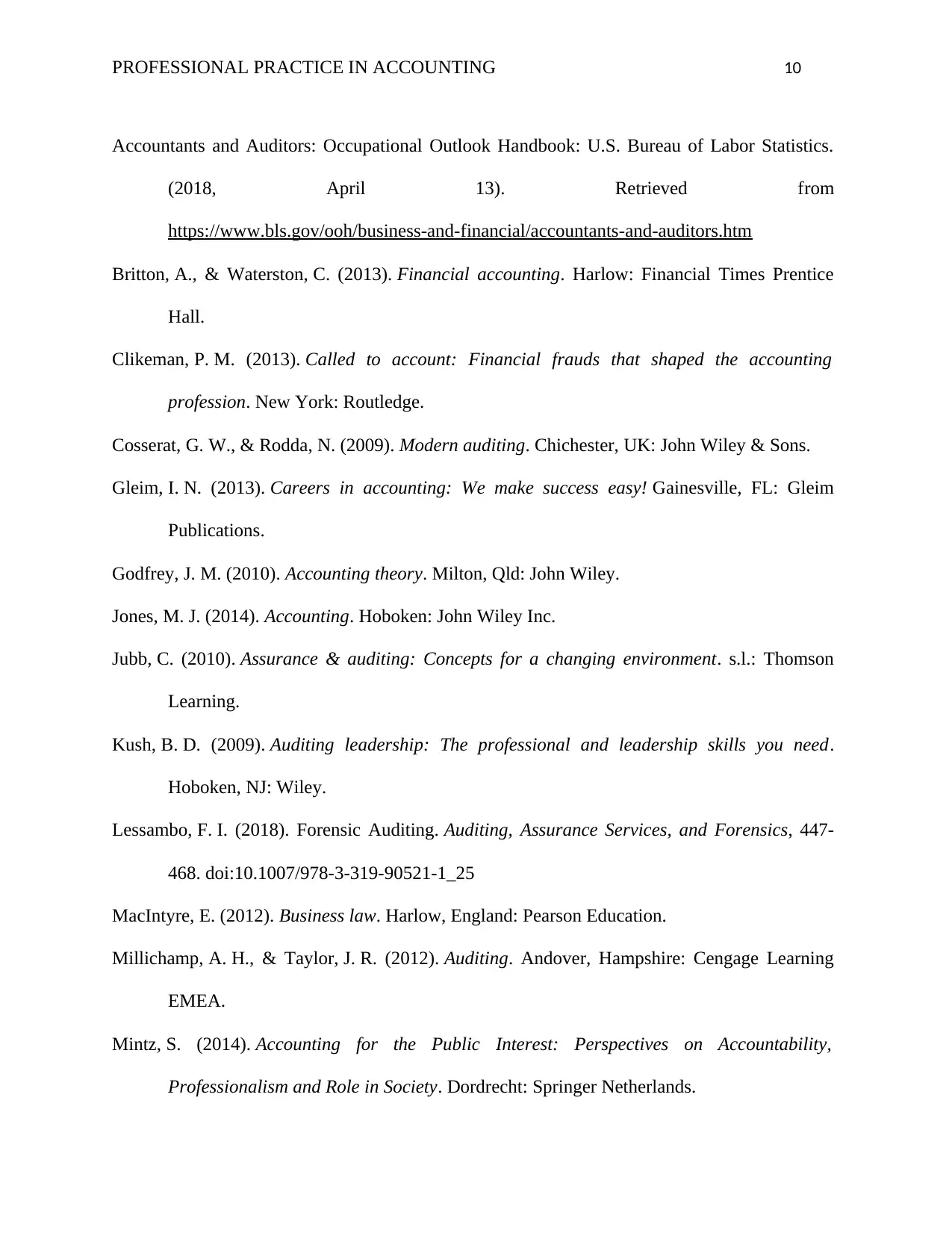
PROFESSIONAL PRACTICE IN ACCOUNTING 10
Accountants and Auditors: Occupational Outlook Handbook: U.S. Bureau of Labor Statistics.
(2018, April 13). Retrieved from
https://www.bls.gov/ooh/business-and-financial/accountants-and-auditors.htm
Britton, A., & Waterston, C. (2013). Financial accounting. Harlow: Financial Times Prentice
Hall.
Clikeman, P. M. (2013). Called to account: Financial frauds that shaped the accounting
profession. New York: Routledge.
Cosserat, G. W., & Rodda, N. (2009). Modern auditing. Chichester, UK: John Wiley & Sons.
Gleim, I. N. (2013). Careers in accounting: We make success easy! Gainesville, FL: Gleim
Publications.
Godfrey, J. M. (2010). Accounting theory. Milton, Qld: John Wiley.
Jones, M. J. (2014). Accounting. Hoboken: John Wiley Inc.
Jubb, C. (2010). Assurance & auditing: Concepts for a changing environment. s.l.: Thomson
Learning.
Kush, B. D. (2009). Auditing leadership: The professional and leadership skills you need.
Hoboken, NJ: Wiley.
Lessambo, F. I. (2018). Forensic Auditing. Auditing, Assurance Services, and Forensics, 447-
468. doi:10.1007/978-3-319-90521-1_25
MacIntyre, E. (2012). Business law. Harlow, England: Pearson Education.
Millichamp, A. H., & Taylor, J. R. (2012). Auditing. Andover, Hampshire: Cengage Learning
EMEA.
Mintz, S. (2014). Accounting for the Public Interest: Perspectives on Accountability,
Professionalism and Role in Society. Dordrecht: Springer Netherlands.
Accountants and Auditors: Occupational Outlook Handbook: U.S. Bureau of Labor Statistics.
(2018, April 13). Retrieved from
https://www.bls.gov/ooh/business-and-financial/accountants-and-auditors.htm
Britton, A., & Waterston, C. (2013). Financial accounting. Harlow: Financial Times Prentice
Hall.
Clikeman, P. M. (2013). Called to account: Financial frauds that shaped the accounting
profession. New York: Routledge.
Cosserat, G. W., & Rodda, N. (2009). Modern auditing. Chichester, UK: John Wiley & Sons.
Gleim, I. N. (2013). Careers in accounting: We make success easy! Gainesville, FL: Gleim
Publications.
Godfrey, J. M. (2010). Accounting theory. Milton, Qld: John Wiley.
Jones, M. J. (2014). Accounting. Hoboken: John Wiley Inc.
Jubb, C. (2010). Assurance & auditing: Concepts for a changing environment. s.l.: Thomson
Learning.
Kush, B. D. (2009). Auditing leadership: The professional and leadership skills you need.
Hoboken, NJ: Wiley.
Lessambo, F. I. (2018). Forensic Auditing. Auditing, Assurance Services, and Forensics, 447-
468. doi:10.1007/978-3-319-90521-1_25
MacIntyre, E. (2012). Business law. Harlow, England: Pearson Education.
Millichamp, A. H., & Taylor, J. R. (2012). Auditing. Andover, Hampshire: Cengage Learning
EMEA.
Mintz, S. (2014). Accounting for the Public Interest: Perspectives on Accountability,
Professionalism and Role in Society. Dordrecht: Springer Netherlands.
Paraphrase This Document
Need a fresh take? Get an instant paraphrase of this document with our AI Paraphraser
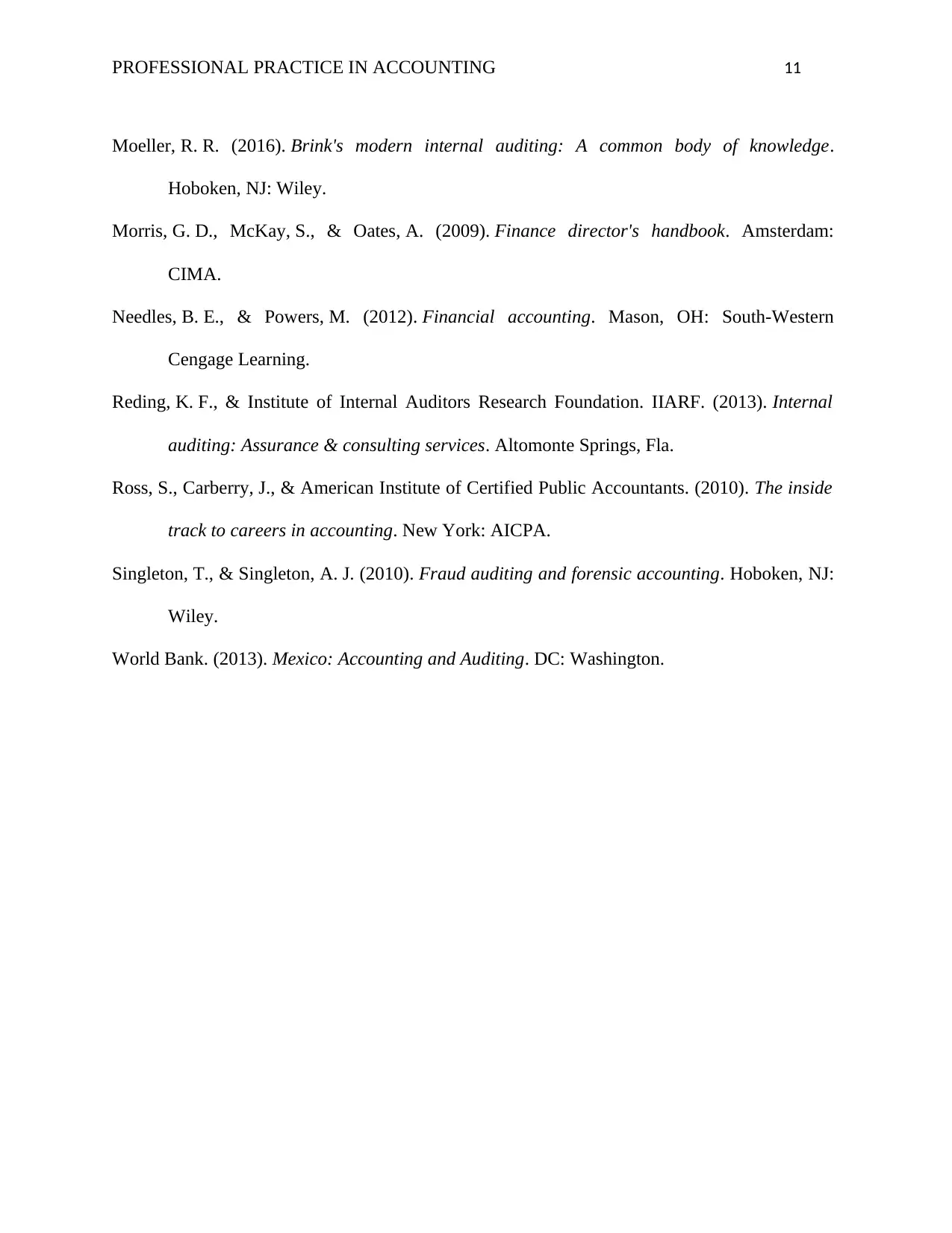
PROFESSIONAL PRACTICE IN ACCOUNTING 11
Moeller, R. R. (2016). Brink's modern internal auditing: A common body of knowledge.
Hoboken, NJ: Wiley.
Morris, G. D., McKay, S., & Oates, A. (2009). Finance director's handbook. Amsterdam:
CIMA.
Needles, B. E., & Powers, M. (2012). Financial accounting. Mason, OH: South-Western
Cengage Learning.
Reding, K. F., & Institute of Internal Auditors Research Foundation. IIARF. (2013). Internal
auditing: Assurance & consulting services. Altomonte Springs, Fla.
Ross, S., Carberry, J., & American Institute of Certified Public Accountants. (2010). The inside
track to careers in accounting. New York: AICPA.
Singleton, T., & Singleton, A. J. (2010). Fraud auditing and forensic accounting. Hoboken, NJ:
Wiley.
World Bank. (2013). Mexico: Accounting and Auditing. DC: Washington.
Moeller, R. R. (2016). Brink's modern internal auditing: A common body of knowledge.
Hoboken, NJ: Wiley.
Morris, G. D., McKay, S., & Oates, A. (2009). Finance director's handbook. Amsterdam:
CIMA.
Needles, B. E., & Powers, M. (2012). Financial accounting. Mason, OH: South-Western
Cengage Learning.
Reding, K. F., & Institute of Internal Auditors Research Foundation. IIARF. (2013). Internal
auditing: Assurance & consulting services. Altomonte Springs, Fla.
Ross, S., Carberry, J., & American Institute of Certified Public Accountants. (2010). The inside
track to careers in accounting. New York: AICPA.
Singleton, T., & Singleton, A. J. (2010). Fraud auditing and forensic accounting. Hoboken, NJ:
Wiley.
World Bank. (2013). Mexico: Accounting and Auditing. DC: Washington.
1 out of 11
Related Documents
Your All-in-One AI-Powered Toolkit for Academic Success.
+13062052269
info@desklib.com
Available 24*7 on WhatsApp / Email
![[object Object]](/_next/static/media/star-bottom.7253800d.svg)
Unlock your academic potential
© 2024 | Zucol Services PVT LTD | All rights reserved.





